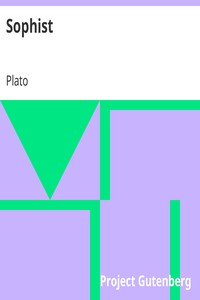Sophist by Plato
"Sophist" by Plato is a philosophical dialogue written in the late 4th century BC. The work explores profound metaphysical questions, particularly focusing on the nature of being, not-being, and the distinction between true philosophy and sophistry. Central to the dialogue is the Eleatic Stranger, who embarks on a dialectical exploration of these concepts alongside Theaetetus and Socrates, effectively illustrating the contrasts between genuine knowledge and the deceptive tricks of sophists. The opening
of "Sophist" introduces the characters of Theodorus, Theaetetus, and the Eleatic Stranger as they gather to discuss sophistry. Immediately, the dialogue takes on a methodical approach as the characters seek to define the nature of the sophist, using the analogy of an angler to illustrate various aspects of sophistry. The Eleatic Stranger begins to draw parallels between sophists and various forms of hunting and trading, ultimately revealing the complexities and elusive nature of sophists, who are depicted as deceivers skilled at manipulating language and opinion. This portion sets the stage for an in-depth philosophical inquiry into the nuances of being and not-being, leading to greater discussions about knowledge and falsehood later in the text. (This is an automatically generated summary.)
Read or download for free
| How to read | Url | Size | |||
|---|---|---|---|---|---|
| Read now! | https://www.gutenberg.org/ebooks/1735.html.images | 328 kB | |||
| EPUB3 (E-readers incl. Send-to-Kindle) | https://www.gutenberg.org/ebooks/1735.epub3.images | 152 kB | |||
| EPUB (older E-readers) | https://www.gutenberg.org/ebooks/1735.epub.images | 155 kB | |||
| Kindle | https://www.gutenberg.org/ebooks/1735.kf8.images | 265 kB | |||
| older Kindles | https://www.gutenberg.org/ebooks/1735.kindle.images | 251 kB | |||
| Plain Text UTF-8 | https://www.gutenberg.org/ebooks/1735.txt.utf-8 | 280 kB | |||
| Download HTML (zip) | https://www.gutenberg.org/cache/epub/1735/pg1735-h.zip | 148 kB | |||
| There may be more files related to this item. | |||||
Similar Books
About this eBook
| Author | Plato, 428? BCE-348? BCE |
|---|---|
| Translator | Jowett, Benjamin, 1817-1893 |
| Title | Sophist |
| Note | Wikipedia page about this book: en.wikipedia.org/wiki/Sophist_(dialogue) |
| Note | Socrates |
| Credits | Produced by Sue Asscher, and David Widger |
| Reading Level | Reading ease score: 66.2 (8th & 9th grade). Neither easy nor difficult to read. |
| Language | English |
| LoC Class | B: Philosophy, Psychology, Religion |
| LoC Class | PA: Language and Literatures: Classical Languages and Literature |
| Subject | Classical literature |
| Subject | Logic, Ancient |
| Subject | Ontology |
| Subject | Sophists (Greek philosophy) |
| Subject | Methodology |
| Subject | Meaning (Philosophy) |
| Category | Text |
| EBook-No. | 1735 |
| Release Date | May 1, 1999 |
| Most Recently Updated | Jan 16, 2013 |
| Copyright Status | Public domain in the USA. |
| Downloads | 2004 downloads in the last 30 days. |
| Project Gutenberg eBooks are always free! | |

